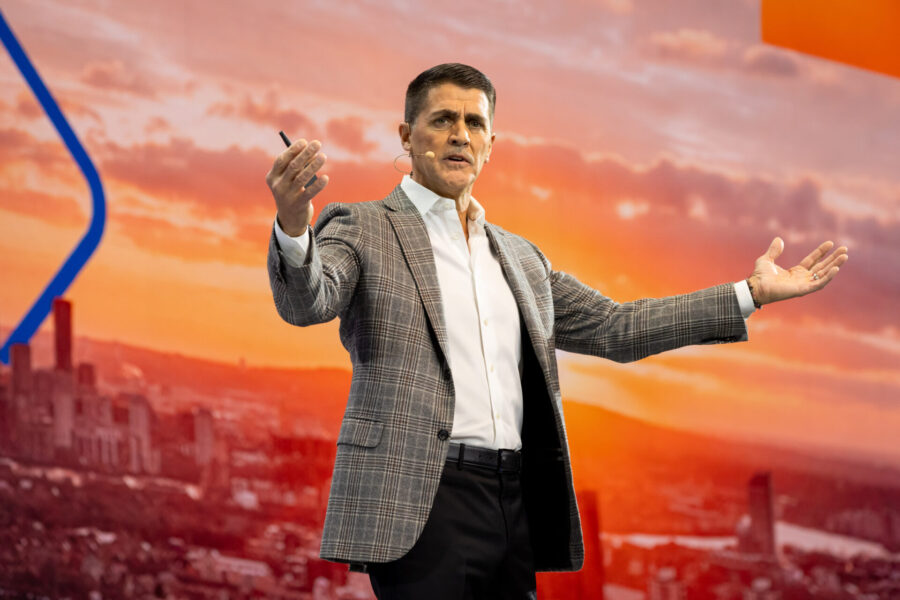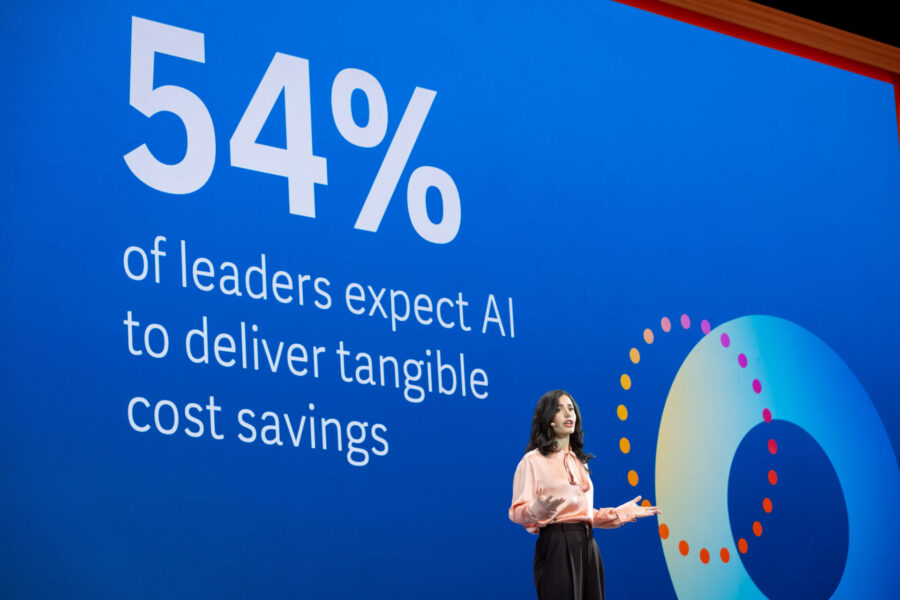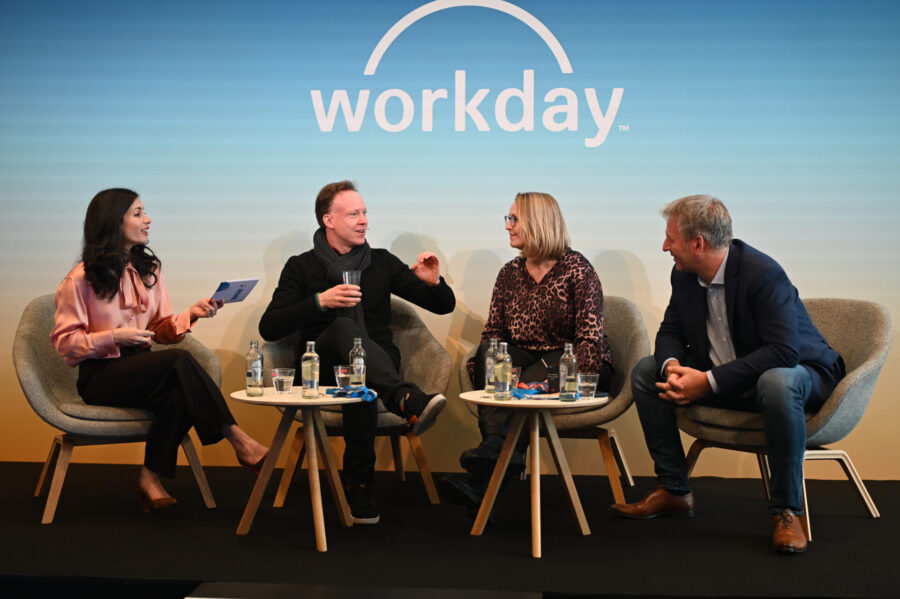Workday CEO: ‘AI may be the largest tectonic shift any of us have ever experienced’
UNLEASH was at Workday Rising EMEA in Amsterdam last week to catch up with all the latest developments from the technology giant. UNLEASH got the full story from customers and Workday execs on what the future of work, powered with AI, could look like.
Expert Insight
Artificial intelligence dominated the talk at Workday Rising EMEA earlier this month.
UNLEASH was in Amsterdam for the vendors European conference, to find out about the latest AI developments from Workday and what its customers think about the technology’s potential for HR.
We also caught up with HiredScore Founder, Athena Karp, for an exclusive interview following the vendor's acquisition by Workday earlier this year.
“The only thing that’s constant in the world we live in today is change, and if the world outside of your company is changing faster than you, the end is near.”
Workday CEO, Carl Eschenbach, sent out a warning to attendees in Amsterdam for the vendor’s Rising EMEA conference last week.
Speaking to the conference’s theme of ‘Forever Forward’, the forces of evolution, transformation and change were center stage during the address.
Understandably, this translated into a focus on AI and the technology’s potential to enhance and disrupt every facet of business operations and culture.
“Every business in every industry across every geography in the world is being reimagined in the age of AI. Simply put, this may be the largest tectonic shift any of us have ever experienced,” Eschenbach told attendees.
The only thing constant is change and as leaders of our organizations, whether it’s in IT, whether it’s in HR, whether it’s in a finance organization, we need to continue to push our companies forward, because we’re in the midst of a lot of opportunity and a lot of disruption – disruption in the form of technologies like AI.”

Workday CEO, Carl Eschenbach, delivers the welcome keynote at Workday Rising EMEA
Having announced the launch of the Workday Illuminate platform at the US iteration of Rising in Las Vegas three months ago, Eschenbach repeated his assertion at the time that “for all the dollars that have been invested so far and all the buzz, we have yet to realize the full promise of what AI can deliver.”
However, Eschenbach was adamant that AI is pivotal to both the future of work and of Workday, detailing that a further “80 capabilities” will be added to Illuminate next year while maintaining “a deep focus on keeping humans in trust at the center of all things.”
Generative AI also holds potential for Workday, which is currently testing its Co-Pilot with selected customers with the view to push the agentic AI feature out further next year.
“Some of our customers who are already using the Workday Assistant are seeing a nearly 30% deflection in the number of HR cases that actually have to hit a human,” Eschenbach said.
“With the new Workday Assistant coming out soon, it’s only going to get better.”
Building new AI solutions powered by Workday
In February this year, Workday announced the acquisition of talent orchestration technology provider, HiredScore.
During Workday Rising EMEA, UNLEASH sat down with founder and General Manager of HiredScore, Athena Karp, to find out more about how the integration into Workday has played out.
Karp tells UNLEASH that due to the two firms having worked closely together “for many years” and shared numerous clients – including “Workday’s most complex global organizations” – meaning it has been able to deliver an ROI to clients much faster than other AI-based solutions can.
“Since we’ve been acquired we’ve been focused on creating collaborative products that as a partner, you would just never be able to have that depth and have both sides be customized,” she explains.
“Building things that take the best of Workday, the best of HiredScore, and then deliver into a new generation of products.”

Athena Karp, General Manager HiredScore, Workday, on stage during Workday Rising EMEA
Karp explains that HiredScore clients “always wanted more from us” in terms of consistently building new products.
Since becoming part of Workday, Karp says the ability to scale from its previous size to having a “19,000 person organization behind us” allowed for increased velocity and volume of AI incubations it could handle.
Looking forward to what will be top of mind for customers in the coming year, Karp tells UNLEASH that immediate concerns will focus on “jobs changing faster than ever before”, meaning expertise and job-specific skills may not hold the same values as they once did.
Workers and workforces augmented by AI will help to address this trend, Karp explains, but there will also be longer-term benefits for organizations.
“We’ve seen some amazing research out of MIT, that an AI agent coaching less experienced workers in a specific area, when the AI tool had an outage, that worker didn’t just drop to the pre-AI stage of low expertise and low capability,” Karp details.
“They actually maintained a higher level of expertise, because the tool wasn’t just coaching them, it’s also teaching them. That opens up the possibility, that we’ve always talked about, hiring for potential, but that often had so much risk to the business.
Now with AI tools, augmenting people, especially in HR, we can actually realize that vision that we’ve had for a long time.”
AI as a foundational layer of innovation
UNLEASH wanted to discover what Workday’s customers think of the AI – how are these organizations orchestrating integration of AI into their technology stacks and deriving value from Workday’s offerings as the pace of change increases.
Efthymios Zindros, Global HRIS Director at Philips, sat down with UNLEASH to explain how the healthcare technology giant is focused on ensuring technology enables its standardization/localization “balancing act”, while also delivering both hygiene and value-add factors.
Zindros explains that Philips has been “investing heavily in AI” within its own solutions and that “it’s great to see” partner vendors in the HR technology space making similar progress.
However, he also says that AI is still only just a foundational factor for the time being, another hygiene factor that is yet to achieve a more complete offering.
“There is that hygiene layer of AI that needs to be applied in a compliant way, which is respecting privacy, security, legislations – you name it. Then, based on that foundation, in my view, in the coming years we’ll see quite some nice news stories.
Are those new stories there at the moment? I don’t think so. I don’t think anyone has figured out how to use AI from all those perspectives; compliance, privacy, security, end to end.”
One area of AI development that Zindros and Philips are focused on in the short-term is agentic AI: “That’s why we’re quite happy with the direction that workday is going and many other vendors are going towards,” he says.
“We see how embedding AI in existing workflows can add a lot of value. So a combination of adding augmentation in the flow of work, plus agentic AI offering functional guidance – not transactional guidance, but true functional guidance towards some of those core processes.
“We see a lot of volume coming in that space and we are investing happily towards that, especially next year.”
Defining what type of tool AI is for what purpose
Not all organizations are at the same level of expertise or enthusiasm with AI, however, and many are still focused on accumulating the use cases to demonstrate the value AI can bring about for HR.
Speaking as part of a Workday customer panel, Volker Schrank, VP of Global Employee Experience & HR Technology at food and drink multinational Mondalez, acknowledged that the proliferation of Gen AI tools means the “opportunities have changed.”
“We’re not saying: here’s Gen AI, let’s throw it against the wall and see what sticks. We were there in 2023, but these days are over. Now it’s really: what is the use case? What is the challenge?” Schrank explained.
“Is AI the hammer for the nail, or do you need a screwdriver for the screw?”

L-R: Athena Karp, Volker Schrank, Tanja Schroeder and Pierre Ramery take part in a Workday customer panel discussion
German technology giant Siemens has been on its own AI journey since 2018 alongside Workday. Tanja Schroeder, Global Head of People & Operations Digitization, explained that beyond the technical implementation of AI, managing the anticipation of employees is vital.
“There’s a lot of expectations towards AI. Everybody thinks: ‘Okay, I can use ChatGPT now, why is it not possible in the corporate world?’ It takes a while to actually adapt these technologies, also to make them fit to our processes. So first of all, it’s really expectation management that is crucial.”
From there, Schroeder said, it’s a case of fitting AI to company culture and mentality, adopting an attitude of being willing to start, fail and then examine the reasons why it failed to start again differently.
“You really need to think about how is AI fitting into that process, and how does it complement the person or the people with that process,” she explained.
At the other end of the scale, Belgian utilities systems manufacturer Aliaxis is still in the early days of its AI journey.
Pierre Ramery, VP of IT Global Business Solutions, explained that while the company is making “very basic investment for the moment” and is “nowhere near maturity”, there is an anticipation “it will become more and more disruptive.”
“We want to generate and create the intersection of the ‘art of possible’ with AI and our pain points. This is the sweet spot, where we can generate value. Otherwise it’s just a gimmick,” Ramery stated.
I’m super passionate about AI, but we’re not doing AI for AI’s sake.”
Sign up to the UNLEASH Newsletter
Get the Editor’s picks of the week delivered straight to your inbox!

Senior Journalist
John Brazier is an experienced and award-winning B2B journalist and editor, with a strong track record of hosting conferences, webinars, roundtables and video products. He has a keen interest in emerging technologies within the HR space, as well as wellbeing and employee experience topics. Prior to joining UNLEASH, John both led and wrote for various global and domestic financial services publications, including COVER Magazine, The TRADE, and WatersTechnology.
Get in touch via email: john@unleash.ai
